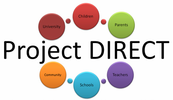This year I’m working in a classroom of wonderful kids at my partner school. The students in my classroom have skill levels all across the board which has been a new challenge for me. Some are far above the average in math, for example, and can count to 200 and are already experts at adding and subtacting, while others are still struggling to count to 5. This semester, I’m lucky enough to be shadowing the school’s speech-language pathologist for a few hours a month, as I hope to study speech-language pathology in graduate school.
Additionally, I’m working on a service learning project alongside the teachers of my classroom this semester. Although I am still deciding on exactly what I’d like to do, my project will likely involve center-time. More specifically, I’d like to focus on center-time transitions and/or teaching the students about proper care and organization of the items in the center (e.g. dress-up clothing, blocks, art supplies, etc.). I’m really looking forward to continuing to develop my project, and to making it come to life in the next few months!
Additionally, I’m working on a service learning project alongside the teachers of my classroom this semester. Although I am still deciding on exactly what I’d like to do, my project will likely involve center-time. More specifically, I’d like to focus on center-time transitions and/or teaching the students about proper care and organization of the items in the center (e.g. dress-up clothing, blocks, art supplies, etc.). I’m really looking forward to continuing to develop my project, and to making it come to life in the next few months!

 RSS Feed
RSS Feed